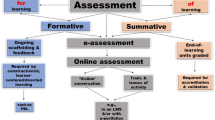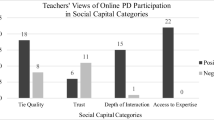Abstract
Instructional designers (IDs) are continually seeking opportunities to share teaching and learning design strategies and learn from their fellow IDs. An application of Community of Practice (CoP) has allowed instructional design professionals to participate in an open learning setting as a way to continue their professional development (PD), share thoughts and ideas, and keep up on the trends and issues related to the field of instructional design. This formative evaluation examined semi-annual, CoP-based PD opportunities held openly in Canvas Learning Management System (LMS), which gathered IDs from around the world to participate in online discussions, presentations, and other knowledge-sharing activities without any cost. Data were collected from the LMS usage log and corroborated by insights from co-founders of the group, presenters, and participants of PD obtained through an anonymous survey. Findings show that the lack of time, issues with trust, bonding, and open communication, as well as less-favored activities influenced ID’s participation in the PD events. Implications for improving the CoP-based PD events are additionally presented.





Similar content being viewed by others
References
Bond, M. A., & Lockee, B. B. (2018). Evaluating the effectiveness of faculty inquiry groups as communities of practice for faculty professional development. Journal of Formative Design in Learning, 2, 1–7. https://doi.org/10.1007/s41686-018-0015-7.
Bonk, C. J., Lee, M. M., Reeves, T. C., & Reynolds, T. H. (2018). The emergence and design of massive open online courses. In R. A. Reiser & J. V. Dempsey (Eds.), Trends and issues in instructional design and technology (pp. 250–258). New York: Pearson.
Borzillo, S., Aznar, S., & Schmitt, A. (2011). A journey through community of practice: how member and why members move from the periphery to the core. European Management Journal, 29, 25–42. https://doi.org/10.1016/j.emj.2010.08.004.
Cadiz, D., Sawyer, J. E., & Griffith, T. L. (2009a). Developing and validating field measurement scales for absorptive capacity and experienced community of practice. Educational and Psychological Measurement, 69(6), 1035–1058. https://doi.org/10.1177/0013164409344494.
Cadiz, D., Sawyer, J. E., & Griffith, T. L. (2009b). Experienced Community of Practice Scale [database record]. Retrieved from PsycTESTS https://doi.org/10.1037/t05787-000.
Correll, S. (1995). The ethnography of an electronic bar: the lesbian cafe. Journal of Contemporary Ethnography, 24(3), 270–290.
Dietz, B., Hurn, J. E., Mays, T. A., & Woods, D. (2018). An introduction to learning analytics. In R. A. Reiser & J. V. Dempsey (Eds.), Trends and issues in instructional design and technology (pp. 104–111). New York: Pearson.
Dietz-Uhler, B., & Hurn, J. (2013). Using learning analytics to predict (and improve) student success: A faculty perspective. Journal of Interactive Online Learning, 12(1), 17–26.
Duncan-Howell, J. (2010). Teachers making connections: online communities as a source of professional learning. British Journal of Educational Technology, 41(2), 324–340. https://doi.org/10.1111/j.1467-8535.2009.00953.x.
Gorrell, J., Kitsantas, A., & Matthews, W. K. (2013). Community of Practice Scale for Schools [Database record]. Retrieved from PsycTESTS. https://doi.org/10.1037/t29882-000.
Guan, X. (2006). Reasons for the formation of cybernetic lurkers. Journal of Huaihai Institute of Technology, 4(3), 79–82.
Guldberg, K., & MacKness, J. (2009). Foundations of communities of practice: enablers and barriers to participation. Journal of Computer Assisted Learning, 25(6), 528–538. https://doi.org/10.1111/j.1365-2729.2009.00327.x.
Jones, K. M. L., Stephens, M., Branch-Mueller, J., & de Groot, J. (2016). Community of practice or affinity space: a case study of a professional development MOOC. Education for Information, 32, 101–119. https://doi.org/10.3233/EFI-150965.
Kollock, P., & Smith, M. (1996). Computer-mediated communication: linguistic, social, and cross-cultural perspectives. In S. Herring (Ed.), Managing the virtual commons: cooperation and conflict in computer communities. Amsterdam: John Benjamins.
Krutka, D. G., Carpenter, J. P., & Trust, T. (2017). Enriching professional learning networks: a framework for identification, reflection, and intention. TechTrends, 61(3), 246–252. https://doi.org/10.1007/s11528-016-0141-5.
Lai, H.-M., & Chen, T. T. (2014). Knowledge sharing in interest online communities: a comparison of posters and lurkers. Computers in Human Behavior, 35, 295–306. https://doi.org/10.1016/j.chb.2014.02.004.
Lave, J., & Wenger, E. (1991). Situated learning: legitimate peripheral participation. New York: Cambridge University Press.
Lesser, E., & Everest, K. (2001). Using communities of practice to manage intellectual capital. Ivey Business Journal, 65(4), 37–41.
Marett, K., & Joshi, K. D. (2009). The decision to share information and rumors: Examining the role of motivation in an online discussion forum. Communications of the Association for Information Systems, 24(1), 47–68.
Nieveen, N., & Folmer, E. (2013). Formative evaluation in educational design research. In T. Plomp & N. Nieveen (Eds.), Educational design research Part A: an introduction (pp. 152–169). The Netherlands: Netherlands Institute for Curriculum Development.
Phang, C. W., Kankanhalli, A., & Sabherwal, R. (2009). Usability and sociability in online communities: a comparative study of knowledge seeking and contribution. Journal of the Association for Information Systems, 10(10), 721–747.
Preece, J. (2000). Online communities: designing usability, supporting sociability. Chichester: Wiley.
Preece, J., Nonnecke, B., & Andrews, D. (2004). The top five reasons for lurking: improving community experiences for everyone. Computers in Human Behavior, 20(2), 201–223.
Qi, J., & Reid, B. (2016). Course content engagements. In Analytics in course design. Retrieved from https://learn.canvas.net/courses/1176. Accessed 6 March 2020.
Rafaeli, S., Ravid, G., & Soroka, V. (2004). De-lurking in virtual communities: a social communication network approach to measuring the effects of social and cultural capital. In Proceedings of the 37th Hawaii International Conference on System Sciences (pp. 1–10). Hawaii.
Ritzhaupt, A. D., & Kumar, S. (2015). Knowledge and skills needed by instructional designers in higher education. Performance Improvement Quarterly, 28(3), 51–69. https://doi.org/10.1002/piq.21196.
Schwier, R. A., Campbell, K., & Kenny, R. (2004). Instructional designers’ observations about identity, communities of practice and change agency. Australasian Journal of Educational Technology, 20(1), 69–100.
Sharif, A., & Cho, S. (2015). 21st-century instructional designers: bridging the perceptual gaps between identity, practice, impact and professional development. RUSC University and Knowledge Society Journal, 12(3), 72–85. https://doi.org/10.7238/rusc.v12i3.2176.
Shepherd, A., & Cosgriff, B. (1998). Problem-based learning: a bridge between planning education and planning practice. Journal of Planning Education and Research, 17, 348–357.
Simunich, B., Robins, D. B., & Kelly, V. (2015). The impact of findability on student motivation, self-efficacy, and perceptions of online course quality. American Journal of Distance Education, 29(3), 174–185.
Trust, T., Carpenter, J. P., & Krutka, D. G. (2017). Moving beyond silos: professional learning networks in higher education. Internet and Higher Education, 35, 1–11. https://doi.org/10.1016/j.iheduc.2017.06.001.
Tsai, I.-C. (2012). Understanding social nature of an online community of practice for learning to teach. Educational Technology & Society, 15(2), 271–285.
Tseng, F.-C., & Kuo, F.-Y. (2010). Online knowledge sharing self-efficacy measure [Database record]. Retrieved from PsycTESTS. https://doi.org/10.1037/t13007-000.
Tseng, T.-C., & Kuo, F.-Y. (2014). A study on social participation and knowledge sharing in the teachers’ online professional community of practice. Computers & Education, 72, 37–47. https://doi.org/10.1016/j.compedu.2013.10.005.
Wenger, E. (1998a). Communities of practice: learning as a social system. The Systems Thinker, 9, 1–10.
Wenger, E. (1998b). Communities of practice: Learning, meaning, and identity. New York: Cambridge University Press.
Wenger, E. (2001). Supporting communities of practice: A survey of community-oriented technologies. Retrieved from http://www.ewenger.com/tech/
Wenger, E. (2006). Communities of practice: a brief introduction. Retrieved from http://www.ewenger.com/theory/communities_of_practice_intro_WRD.doc
Wenger, E. (2010). Communities of practice and social learning systems: the career of a concept. In C. Blackmore (Ed.), Social learning systems and communities of practice (pp. 179–198). Berlin: Springer Verlag and the Open University.
Wenger, E., & Snyder, W. (2000). Communities of practice: the organizational frontier. Harvard Business Review (Jan–Feb), 139–145.
Wenger, E., McDermott, R., & Snyder, W. (2002). Cultivating communities of practice. A guide to managing knowledge. Cambridge: Harvard University Press.
Wenger, E., White, N., & Smith, J. D. (2009). Digital habitats: stewarding technology for communities. Portland: CPsquare. https://doi.org/10.1109/RCIS.2013.6577673.
Weseley, P. M. (2013). Investigating the community of practice of world language educators on Twitter. Journal of Teacher Education, 64(4), 305–318. https://doi.org/10.1177/0022487113489032.
Woo, D. J. (2015). Central practitioners’ developing legitimate peripheral participation in a community of practice for changing schools. Australasian Journal of Educational Technology, 31(2), 164–176. https://doi.org/10.14742/ajet.314.
Woodgate-Jones, A. (2012). The student teacher and the school community of practice: an exploration of the contribution of the legitimate peripheral participant. Educational Review, 64(2), 145–160.
Zhang, W., & Storck, J. (2001). Peripheral members in online communities. In Proceedings of the 7th Americas Conference on Information Systems (pp. 586–593). Boston.
Author information
Authors and Affiliations
Corresponding author
Ethics declarations
Research involving human participants
This project was reviewed by the Old Dominion University Education Human Subjects Review Committee who then granted an exempt from IRB review status according to federal regulations on March 15, 2019 (project number: 1382020-2). The study was performed in accordance with the ethical standards as laid down in the 1964 Declaration of Helsinki and its later amendments or comparable ethical standards.
Conflict of Interest
The authors declare that they have no conflict of interest.
Informed Consent
Informed consent was obtained from all individual participants included in the study.
Additional information
Publisher’s Note
Springer Nature remains neutral with regard to jurisdictional claims in published maps and institutional affiliations.
Rights and permissions
About this article
Cite this article
Muljana, P.S., Luo, T., Watson, S. et al. Promoting Instructional Designers’ Participation in Free, Asynchronous Professional Development: A Formative Evaluation. J Form Des Learn 4, 74–87 (2020). https://doi.org/10.1007/s41686-020-00044-4
Published:
Issue Date:
DOI: https://doi.org/10.1007/s41686-020-00044-4




